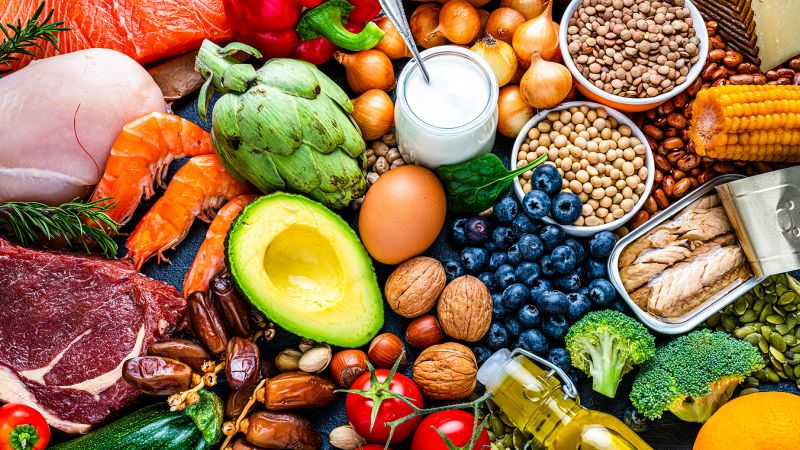Thinking about cutting fat completely to lose weight? Hold on! Not all fats are bad, and some are actually helpful for weight loss. This article explores how much healthy fat you should incorporate into your daily diet to lose weight effectively and stay on track.
Surprised? Studies show including moderate amounts of fat (20-30% of your calories) can actually aid weight loss. Why? Because restrictive, low-fat diets are often hard to maintain in the long run.
Keep reading to discover the recommended daily fat intake for weight loss and find out which fats are a dietitian's favorites!
Absolutely! Here's an extended version that dives deeper into the different types of fats and provides additional tips:
Don't ditch fat for weight loss, make it a smart partner!
Fats may be labeled as the culprit behind weight gain, but they're an essential part of a balanced diet. Registered dietitian Melissa Galich explains that focusing on the right kind of fats is key.
Instead of aiming for a low-fat approach, shoot for 20-30% of your daily calories to come from fat. But prioritize heart-healthy fats like those found in:
- Olive oil: A superstar for its monounsaturated fat content, olive oil is perfect for drizzling, dressing salads, and adding a touch of richness to cooked dishes.
- Avocados: Packed with monounsaturated and healthy fats, avocados add creaminess and a satisfying texture to meals.
- Nuts and seeds: Almonds, walnuts, flaxseeds, and chia seeds are loaded with beneficial fats, fiber, and protein – a triple threat for weight management!
- Fatty fish: Salmon, sardines, and mackerel are brimming with omega-3 fatty acids, essential fats that promote heart health and may even aid weight loss.
When it comes to the not-so-friendly fats, saturated and trans fats are the ones to limit.
- Saturated fat: Found in fatty cuts of meat, full-fat dairy products, and some plant oils like palm and coconut oil, saturated fat should be enjoyed in moderation. Opt for lean meats, skinless chicken, fish, and low-fat dairy to keep your intake in check.
- Trans fat: This artificial fat is the real villain. It lurks in processed foods with ingredients like hydrogenated or partially hydrogenated oils. Become a label-reading detective! Avoid these sneaky ingredients and choose healthier options if you see them listed.
Remember, portion control is key. Even healthy fats are calorie-dense, so enjoy them in moderation. By making smart choices and incorporating a variety of healthy fats into your diet, you can support weight loss and overall well-being.
Craving a healthy fat boost? Look no further than monounsaturated and polyunsaturated fats! These superstars contribute to overall well-being by raising your "good" HDL cholesterol and lowering the artery-clogging LDL kind. They also keep your brain sharp, cells functioning properly, and even reduce inflammation, according to dietician [expert name].
But remember, even healthy fats need moderation. Consuming too much can tip the scales in terms of calories, potentially leading to weight gain or increased cholesterol. So, how can you incorporate these beneficial fats without going overboard?
Fill your pantry with these heart-healthy options:
- Seeds: Tiny but mighty, all types of seeds are nutritional powerhouses. Chia seeds are a particularly good source of omega-3 fatty acids.
- Nut butters: Nut butters are a delicious and convenient way to get your healthy fat fix. Just be mindful of added sugars and choose natural varieties.
- Flaxseed: This versatile seed can be ground and sprinkled on cereal, oatmeal, or even baked into goods. It's another great source of omega-3s and fiber.
- Avocado: This creamy fruit is a superstar for good reason. It's loaded with healthy fats, fiber, and vitamins, making it a perfect addition to toast, salads, or guacamole.
- Cooking oils: Opt for heart-healthy choices like canola or olive oil for cooking, salad dressings, or marinades.
- Fatty fish: Salmon, tuna, and mackerel are swimming with omega-3 goodness. Aim for two servings per week to reap the benefits.
By incorporating these delicious and nutritious options, you can ensure you're getting your daily dose of healthy fats without compromising your health goals.
Don't skimp on healthy fats! They're the secret weapon for absorbing essential vitamins like A, D, E, and K, each playing a vital role in keeping you healthy. Vitamin A is like a superhero for your vision, guarding against night blindness and promoting healthy cell growth throughout your body. It even strengthens your immune system, making you more resistant to illness.
Vitamin D deserves its own spotlight. It's sunshine in vitamin form, crucial for building strong bones and keeping your blood sugar in check. But that's not all! It also acts as a natural anti-inflammatory, supports your immune system, and ensures your muscles and nerves function properly.
Vitamin E is another powerhouse. It goes on the offensive against inflammation throughout your body, protecting your heart health and acting as an antioxidant to fight free radicals – unstable molecules that can increase your risk of chronic diseases like cancer.
Vitamin K plays a behind-the-scenes role, but it's no less important. It acts as the conductor of your blood clotting process, ensuring proper wound healing and preventing excessive bleeding. Additionally, it works alongside Vitamin D to keep your bones strong and healthy.
Remember, a balanced approach is key. No single food is the enemy, and depriving yourself can lead to cravings and unhealthy binges. Fill your plate with nutritious options most of the time, but don't be afraid to indulge in your favorites occasionally. This sustainable approach to eating will help you achieve your weight loss goals and maintain a healthy lifestyle for the long term.













0 Comments